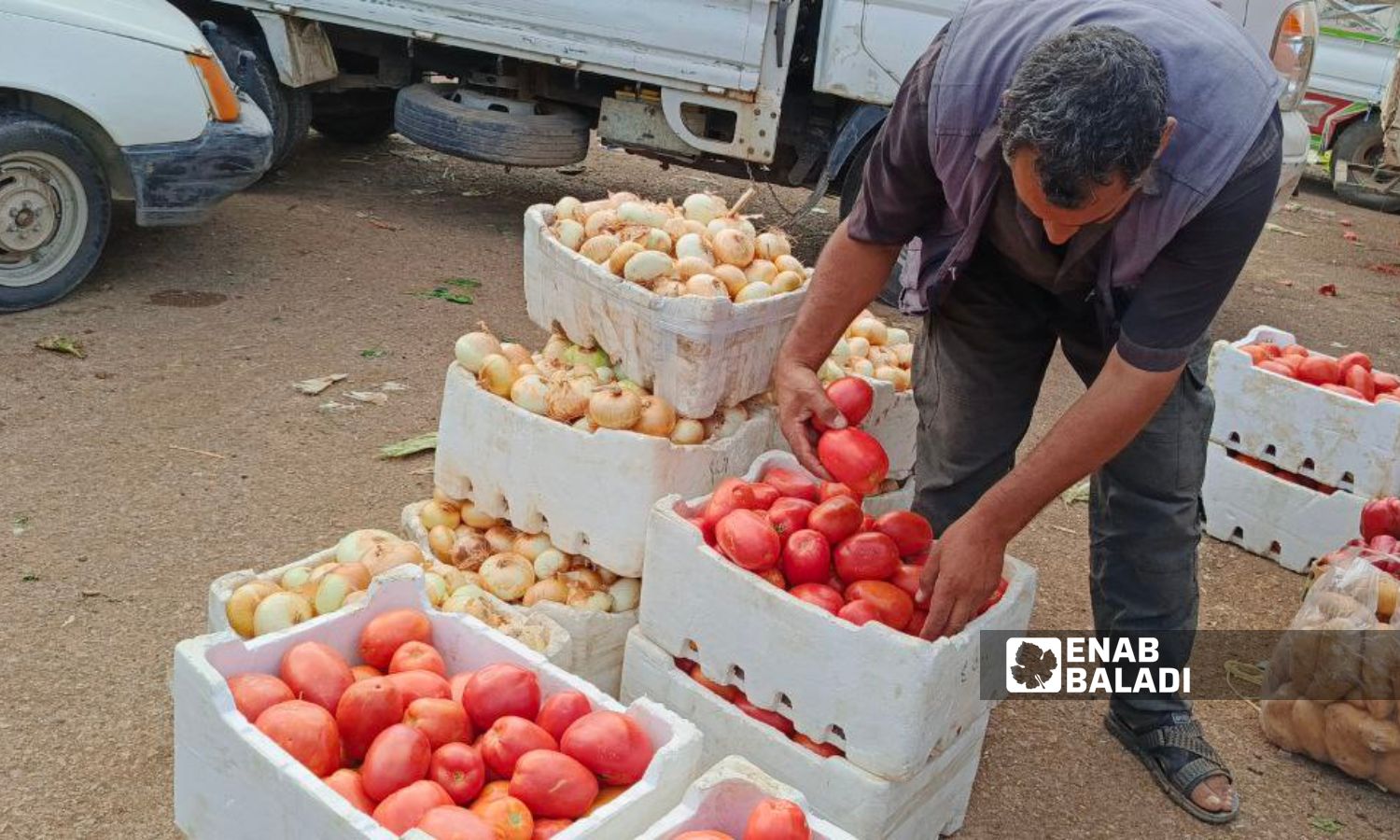



Daraa – Halim Muhammad
The rise in tomato prices in the local market of Daraa governorate in southern Syria has led women to abandon the production of tomato paste, a staple they used to store every year.
Residents buy tomatoes directly from farmers or from the al-Hal wholesale market of the third-grade variety, which is very red and unsuitable for export. The price per kilogram reaches 3,500 Syrian pounds and varies according to quality.
The price of a kilogram of first-grade tomatoes in vegetable shops has reached 7,500 Syrian pounds (0.5 US dollars), the highest price tomatoes have reached during their peak season over the past years.
The Abdel Karim family (56 years old), who live in western rural Daraa, did not make tomato paste this year due to the high price of tomatoes in the local market, unlike last year.
He told Enab Baladi that he bought a kilogram of tomatoes for making paste in 2023 for 500 Syrian pounds, but this year the price of a kilogram of third-grade tomatoes is no less than 3,500 Syrian pounds.
Tomatoes used for paste-making are fully ripe and their price is lower than those exported or sold in the local market.
The Abdel Karim family needs about 60 kilograms of tomatoes to produce approximately 15 kilograms of paste.
The Abdel Karim family also engages in farming, which has recently declined due to the decrease in irrigation water levels, resulting in reduced financial returns.
Mrs. Anaam (33 years old), who lives in western rural Daraa, said that she will not be able to make tomato paste this year due to the continued rise in prices.
She added that she used to make tomato paste every summer when the price of tomatoes dropped during peak production, especially in July.
She mentioned that she had not experienced such a price increase in past years, as it was usual for tomato prices to rise in winter, not in summer during peak production.
Regarding alternatives, Anaam said she would buy ready-made tomato paste by the kilogram, even though her family prefers homemade paste.
The price of a kilogram of ready-made tomato paste produced by factories reaches 11,000 Syrian pounds (0.8 US dollars).
Fatima al-Mafalani (47 years old), a woman from eastern rural Daraa, told Enab Baladi that factory-produced tomato paste is less laborious and similar in price to homemade paste.
She added that she saves effort by buying ready-made paste, as making tomato paste involves laborious stages, including washing, cutting, and juicing the tomatoes, then either sun-drying or boiling the juice until it thickens.
Al-Mafalani said that some factories produce paste that is moderately acidic and less salty compared to homemade paste.
There are 40 canning factories in Daraa, each processing about 2,000 tons of tomatoes, according to the Director of Daraa Industry, Imad Rifai, as reported by the state Tishreen newspaper on July 17.
Price hikes have become usual in Syria, but it is unclear why the prices of goods rise in key production areas.
Daraa governorate is one of the areas producing desirable tomatoes for the local market and exporting them to the Gulf countries.
The Daraa Agriculture Directorate estimated the governorate’s tomato production this season at approximately 400,000 tons.
A vegetable trader in Tafas city said in a previous interview with Enab Baladi that exporting and diverting tomatoes to canning factories are the main reasons for the continuous price rise.
He added that he exports tomatoes from his workshop directly to the Nassib crossing and then to the Gulf countries.
Mohammad al-Akkad, a member of the wholesale market committee, said in a statement to the Al-Thawra newspaper that the quantities exported from July 28 to August 3 total 2,800 tons of vegetables and fruits, distributed among most Gulf countries.
The quantities of fruits and vegetables exported to the Kingdom of Saudi Arabia amounted to 1,075 tons. Kuwait received 225 tons of tomatoes, the United Arab Emirates 125 tons, Bahrain 200 tons, and Oman 75 tons.
Farmers in Daraa prefer to supply tomatoes directly to the factories to save on transportation costs, packaging, and traders’ commissions. The price of a polystyrene box has reached 12,000 Syrian pounds (0.8 US dollars), while transportation costs from Daraa to Damascus are up to 1.2 million Syrian pounds (82 US dollars).
if you think the article contain wrong information or you have additional details Send Correction